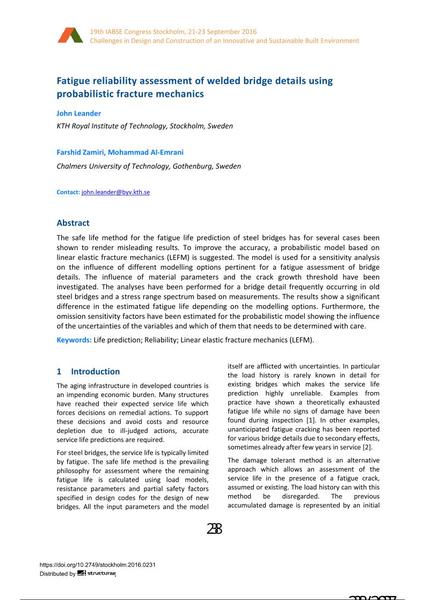Fatigue reliability assessment of welded bridge details using probabilistic fracture mechanics

|
|
|||||||||||
Bibliographic Details
| Author(s): |
John Leander
(KTH Royal Institute of Technology, Stockholm, Sweden)
Farshid Zamiri (Chalmers University of Technology, Gothenburg, Sweden) Mohammad Al-Emrani (Chalmers University of Technology, Gothenburg, Sweden) |
||||
|---|---|---|---|---|---|
| Medium: | conference paper | ||||
| Language(s): | English | ||||
| Conference: | IABSE Congress: Challenges in Design and Construction of an Innovative and Sustainable Built Environment, Stockholm, Sweden, 21-23 September 2016 | ||||
| Published in: | IABSE Congress Stockholm, 2016 | ||||
|
|||||
| Page(s): | 238-246 | ||||
| Total no. of pages: | 9 | ||||
| Year: | 2016 | ||||
| DOI: | 10.2749/stockholm.2016.0231 | ||||
| Abstract: |
The safe life method for the fatigue life prediction of steel bridges has for several cases been shown to render misleading results. To improve the accuracy, a probabilistic model based on linear elastic fracture mechanics (LEFM) is suggested. The model is used for a sensitivity analysis on the influence of different modelling options pertinent for a fatigue assessment of bridge details. The influence of material parameters and the crack growth threshold have been investigated. The analyses have been performed for a bridge detail frequently occurring in old steel bridges and a stress range spectrum based on measurements. The results show a significant difference in the estimated fatigue life depending on the modelling options. Furthermore, the omission sensitivity factors have been estimated for the probabilistic model showing the influence of the uncertainties of the variables and which of them that needs to be determined with care. |
||||
| Keywords: |
reliability life prediction Linear elastic fracture mechanics (LEFM)
|
||||
